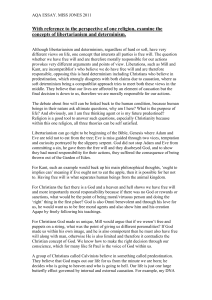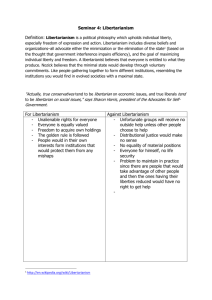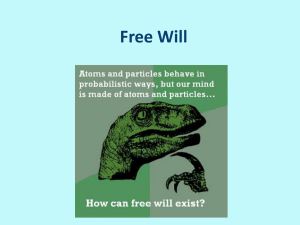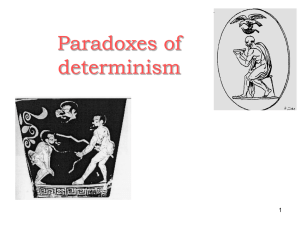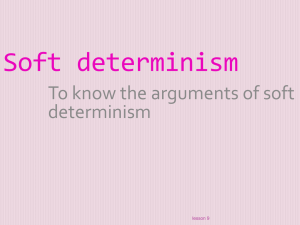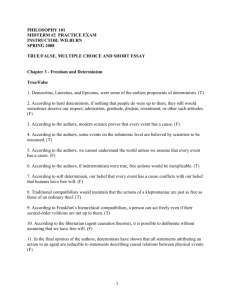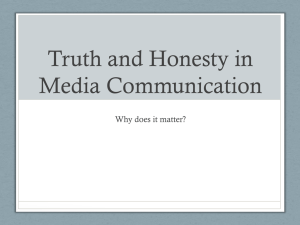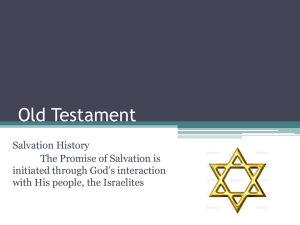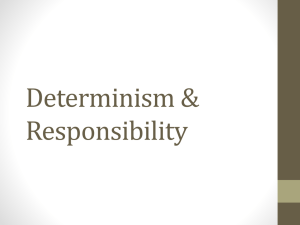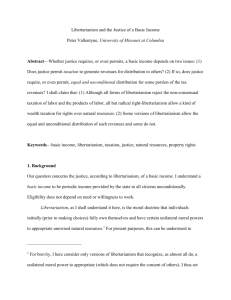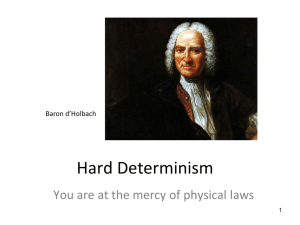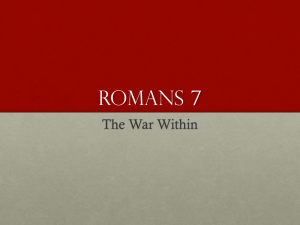Free will?
advertisement
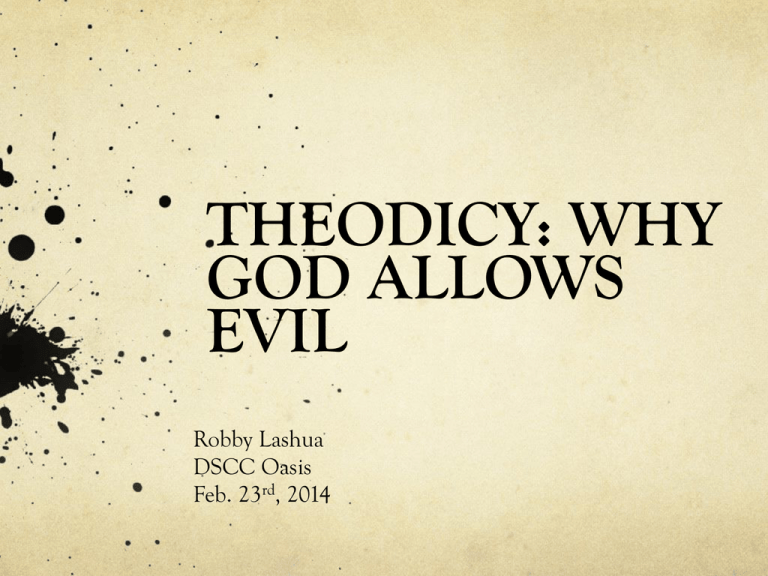
THEODICY: WHY GOD ALLOWS EVIL Robby Lashua DSCC Oasis Feb. 23rd, 2014 FREE WILL Augustine 354-430 A.D. “And I strained to perceive what I now heard, that free-will was the cause of our doing ill.” Free will? • Determinism • Choices are caused by prior conditions • There are two types: Hard Determinism and Soft Determinism. Free will? • Hard Determinism • Free will is an illusion • It is not compatible with determinism. Free will? • Soft Determinism • Free will is compatible with determinism. • Often called Compatibilism Compatibilism • The Principle of Universal Causality • All that happens is the result of cause and effect because of sufficient prior conditions and could not have been any other way. Compatibilism • Freedom is: The freedom to “choose” to do what your greatest inclination or desire is. Compatibilism 1. Law of Choice: a person’s choices are dictated by his desires. “The will always chooses according to its strongest inclination at the moment.” R.C. Sproul Sr. Compatibilism 2. The Causal Necessity of Choice: a person must choose the way he does; no other choice was possible. Determinism fails because it doesn’t account for agent causation and runs the risk of making everything stem from event causation. Free will? • Libertarian Free Will: morally responsible agents are the origin of their choices and prior conditions are not the final determiner for the agent. Free will? • Hard Libertarianism: Persons are genuinely free only if they always have the ability to choose contrary, or that they are free from external influences. Free will? • Soft Libertarianism: A person’s character determines a range of choices that the person would make. Soft Libertarianism • God acts within His character. • “It's logically impossible to make someone freely do something. God's being allpowerful doesn't mean that He can do the logically impossible. Thus, even though He is all-powerful, God cannot make everyone freely be saved. Given human freedom and human stubbornness, some people may go to hell despite God's desire and efforts to save them.” –William Lane Craig Soft Libertarianism • God can’t: • Lie (Num. 23:19, Titus 1:2) • Tempt (James 1:13) • Swear by any name greater than Himself (Heb. 6:13) • Do illogical things (Gen. 1) • God is still free to make choices within the framework of who He is. Five Tenants of Soft Libertarianism 1. Ultimate Responsibility: This indicates the ultimate origin of decisions • The person ultimately responsible for an action is the source/cause of the action. Five Tenants of Soft Libertarianism 2. Agent Causation: a person is the source and origin of their choices. • Romans 5:12 “By one man sin entered into the world” Five Tenants of Soft Libertarianism 3. The Principle of Alternative Possibilities: At crucial times, the ability to choose or refrain from choosing is genuinely available. Five Tenants of Soft Libertarianism 4. The Reality of Will-Setting Moments: • a person does not always have ability to choose the contrary. • Certain free choices result in the loss of freedom. Five Tenants of Soft Libertarianism 5. The Distinction Between Freedom of Responsibility and Freedom of Integrity: • Freedom of Responsibility • The ability to be the originator of our decisions, choices and actions. Five Tenants of Soft Libertarianism 5. The Distinction Between Freedom of Responsibility and Freedom of Integrity: • Freedom of Integrity • The ability to act in a way that is consistent with what a person knows to be the right thing to do. God’s Omniscience Does God’s Foreknowledge of the actual sins we will commit mean Determinism is true? “I wish very frankly and pointedly to assert that if a man gets drunk and shoots his family, it was the will of God that he should do it. It may seem strange at first that God would decree an immoral act, but the Bible shows that he did.” -Gordon H. Clark God’s Omniscience “Doesn’t the most unforced reading of every New Testament command to the Christian lead us to believe that Christians can or could actually do other than sin?” –Clay Jones God’s Omniscience “Because unless I am mistaken, your foreknowledge that a man will sin does not of itself necessitate the sin. Your foreknowledge did not force him to sin even though he was, without doubt, going to sin; otherwise you would not foreknow that which was to be. Thus, these two things are not contradictories. As you, by your foreknowledge, know what someone else is going to do of his own will, so God forces no one to sin; yet He foreknows those who will sin by their own will. God’s Omniscience Why cannot He justly punish what He does not force to be done, even though He foreknows it? Your recollection of events in the past does not compel them to occur. In the same way God’s foreknowledge of future events does not compel them to take place. As you remember certain things that you have done and yet have not done all the things you remember, so God foreknows all the things of which He himself is the Cause, and yet He is not the Cause of all that He foreknows.” Free Will in Heaven? “And there was war in heaven. Michael and his angels fought against the dragon, and the dragon and his angels fought back. But he was jot strong enough, and they lost their place in heaven. The great dragon was hurled down – that ancient serpent called the devil, or Satan, who leads the whole world astray. He was hurled to the earth, and his angels with him.” –Rev. 12:7 Free Will in Heaven? “It may be that we will be able not to sin, rather than not being able to sin. In this case, we would still be free to sin, but we would always choose not to because the glories and virtues of heaven would be so marvelous that no one in heaven would ever choose to act against those benefits.” -Gary Habermas & J.P. Moreland
